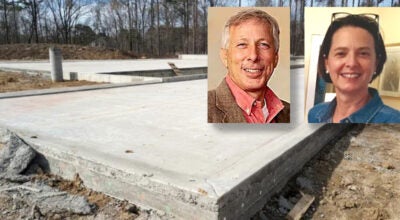Meet this Mississippi school’s 1st Black, female student
Published 7:21 am Sunday, June 6, 2021
Jasáda Penelope Dunbar knows everyone gets nervous for their first day of school.
But when she walked through the doors of Heritage Academy in 1988 to start third grade, her worries reached a different level.
“Is my teacher going to say my name right?” Dunbar thought. “Is anybody else going to realize that I look different?”
As the first Black female student to attend Heritage Academy — her brother Jabari integrated the ninth grade the same year — Dunbar forged a different path than did those who came before her.
It wasn’t an easy one to walk, either. Although Dunbar never considered going anywhere else, she and her brother dealt with their share of abuse as they excelled academically throughout their days on Magnolia Lane.
And now, more than 20 years after she graduated, Dunbar is still active in the Heritage Academy community. Her son Lathan Dunbar-Keys recently finished his freshman year, and through him, Dunbar remains connected to the school where she once made history.
“We do have a legacy here,” Dunbar said. “It’s just our reality. I don’t walk around like, ‘Oh, I have a legacy.’ I’m very humble in the fact that God allowed me to be this little girl who integrated this school, and all these years later, I get to see my kid do it.”
‘THIS LOOKS A LOT DIFFERENT’
When Dunbar’s parents, James and Maxine, moved the family from Memphis, Tennessee, to Columbus, they prepared their older son a lot more than their young daughter.
“No one told me, ‘You’re going to be the only Black at school,’” Dunbar said. “It was, ‘Get ready for school. We have gone and bought you your favorite lunchbox you wanted.’”
On her first day in the fall of 1988, she sat down in an all-white classroom. Then it hit her.
“Wait a minute,” Dunbar thought. “This isn’t like what last year was when I was in Memphis. This looks a lot different.”
At recess, classmate Alana Fields helped assuage Dunbar’s fears by inviting her to play with Fields and her friends. Fields now lives in Austin, Texas, but the two remain close.
It was people like Fields who eased Dunbar’s way even when she faced resistance. Most of her fellow students were welcoming, but it was often teachers and parents who looked down on her because of her race, she said.
“I think for children, if they’re not taught much of a difference, they don’t see it,” Dunbar said. “They see a friend. They naturally invite you to spend the night. Their parents may be the ones who say, ‘No, you can’t.’”
Still, Dunbar — a “free spirit” and “social butterfly” — made Heritage Academy history countless times by the time she graduated in 1998. She was the first Black cheerleader, the first Black yearbook editor, the first Black member of the school’s social club. She helped start Heritage Academy’s first dance team, the Patriettes, and she was its sole Black member.
“You become the first of everything — not on purpose but because you’re a kid who just goes after stuff,” Dunbar said.
‘A FORCE TO BE RECKONED WITH’
Jabari, who died in 2010, helped pave the way for his younger sister.
When he was still in high school, he’d check on Dunbar before she practiced with the band as part of the flag team. She even got help trying out for the junior high cheerleading team from varsity cheerleaders who were friends with her older brother.
But she knows Jabari faced consequences she was sheltered from along the way. As a freshman in his first year at the school, he spent hours drawing, coloring and painting posters of prominent Black figures for Black History Month. The artwork was vandalized. Jabari’s car was defaced three times, too.
Often, Dunbar would see her parents meeting with the high school principal for reasons she never learned. There were conversations at home to which Dunbar wasn’t privy as her brother bore the burden of racial abuse alone.
“My brother was my hero because I cannot imagine just some of the things that he dealt with compared to what I would have dealt with on my own,” Dunbar said.
Jabari remained a stellar student, graduating as Heritage Academy’s salutatorian and going on to graduate summa cum laude from Howard University and attend Howard Law School.
“When I say he was a force to be reckoned with — not because of his color, just as a student at Heritage — that’s the truth,” Dunbar said.
But in the six years between the siblings’ graduations, no other students of color graduated from Heritage. A few came, including a Black boy the second semester of the Dunbars’ first year. For different reasons, none stayed long.
Some of those who transferred in but didn’t enjoy the experience asked Dunbar why she was still at Heritage. For her, there was never a question.
“I don’t ever remember us saying, ‘I wish I went somewhere else’ or ‘I hate going here,’” Dunbar said. “It was just, ‘This is where you go to school.’”
THE NEW GENERATION
It was similar for Lathan, who became Heritage Academy’s only second-generation Black student when started at Heritage Academy in kindergarten. This year, he beat his mother’s record, becoming the longest-tenured Black student at the school.
Already, he’s enjoyed some of the same success that his mother and his uncle once did. As a freshman, he helped create the school’s sports streaming network as well as running for and winning a student government position.
“I have probably the best child in the world, in my opinion,” said Dunbar, a single parent. “He has made parenthood the greatest accomplishment I’ve ever, ever had. He has honestly made my life better than anything I imagined for myself.”
In March, Dunbar spoke to her son’s ninth-grade honors English class about her experience, hoping to educate white students on Heritage Academy’s history and continue to encourage diversity at the school. The students listened intently, hanging on the edge of their seats and asking so many questions they ran out of time with hands still in the air.
“Lathan’s class has real questions and really wants to understand what it was like,” Dunbar said. “Clearly, my walk was different than their parents’ walk. Clearly, my walk was different than their grandparents’ walk.”
More News





